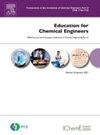Generative AI in graduate bioprocess engineering exams: Is attention all students need?
IF 2.3
2区 教育学
Q1 EDUCATION, SCIENTIFIC DISCIPLINES
引用次数: 0
Abstract
State-of-the-art large language models (LLMs) can now answer conceptual textbook questions with near-perfect accuracy and perform complex equation derivations, raising significant concerns for higher education. This study evaluates the performance of LLMs on graduate-level bioprocess engineering exams, which include multiple-choice, short-answer, and long-form questions requiring calculations. First, allowing students to use LLMs led to a 36 % average score increase compared to exams taken with only textbooks and notes. Second, as students gained more experience using LLMs, their performance improved further, particularly among students with disabilities. Third, under optimized conditions on two exams, OpenAI’s GPT-4o scored approximately 70 out of 100, while more advanced models, such as OpenAI o1, o3, GPT-4.5, Qwen3–235B-A22B, and DeepSeek R1, scored above 84, outperforming 96 % of human test-takers. This indicates that students with access to more capable AI tools may gain an unfair advantage. Fourth, we propose guidelines for developing exam questions that are less susceptible to LLM-generated solutions. These include tasks such as interpreting graphical biological pathways, answering negatively worded conceptual questions, performing complex numerical calculations and optimizations, and solving open-ended research problems that demand critical thinking. This article calls for urgent reforms to bioprocess engineering education, advocating for the integration of LLM literacy through hands-on activities that address both practical applications and ethical considerations.
生物过程工程研究生考试中的生成人工智能:所有学生都需要关注吗?
最先进的大型语言模型(llm)现在可以近乎完美地回答教科书上的概念问题,并执行复杂的方程推导,这引起了高等教育的重大关注。本研究评估法学硕士在研究生水平的生物过程工程考试中的表现,包括多项选择题、简答题和需要计算的长题型。首先,与只使用课本和笔记的考试相比,允许学生使用法学硕士课程的考试平均成绩提高了36% %。其次,随着学生在法学硕士课程中获得更多经验,他们的表现进一步提高,尤其是在残疾学生中。第三,在两次考试的优化条件下,OpenAI的gpt - 40得分约为70分(满分100分),而更先进的模型,如OpenAI o1、o3、GPT-4.5、Qwen3-235B-A22B和DeepSeek R1得分在84分以上,超过96% %的人类考生。这表明,能够使用更强大的人工智能工具的学生可能会获得不公平的优势。第四,我们提出了制定不太容易受到法学硕士生成的解决方案影响的考试问题的指导方针。这些任务包括解释图形生物学途径,回答否定的概念问题,执行复杂的数值计算和优化,以及解决需要批判性思维的开放式研究问题。本文呼吁对生物过程工程教育进行紧急改革,倡导通过解决实际应用和伦理考虑的实践活动来整合法学硕士素养。
本文章由计算机程序翻译,如有差异,请以英文原文为准。
求助全文
约1分钟内获得全文
求助全文
来源期刊

Education for Chemical Engineers
Multiple-
CiteScore
8.80
自引率
17.90%
发文量
30
审稿时长
31 days
期刊介绍:
Education for Chemical Engineers was launched in 2006 with a remit to publisheducation research papers, resource reviews and teaching and learning notes. ECE is targeted at chemical engineering academics and educators, discussing the ongoingchanges and development in chemical engineering education. This international title publishes papers from around the world, creating a global network of chemical engineering academics. Papers demonstrating how educational research results can be applied to chemical engineering education are particularly welcome, as are the accounts of research work that brings new perspectives to established principles, highlighting unsolved problems or indicating direction for future research relevant to chemical engineering education. Core topic areas: -Assessment- Accreditation- Curriculum development and transformation- Design- Diversity- Distance education-- E-learning Entrepreneurship programs- Industry-academic linkages- Benchmarking- Lifelong learning- Multidisciplinary programs- Outreach from kindergarten to high school programs- Student recruitment and retention and transition programs- New technology- Problem-based learning- Social responsibility and professionalism- Teamwork- Web-based learning
 求助内容:
求助内容: 应助结果提醒方式:
应助结果提醒方式:


